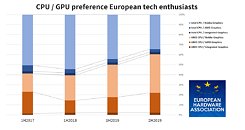
IBM & Inclusive Brains Announce Collab: Combining AI, Quantum & Neurotechnologies
IBM and Inclusive Brains, a leader in non-invasive neurotechnologies and multimodal artificial intelligence, have entered a joint study agreement to experiment with advanced AI and quantum machine learning techniques. The aim of the joint study is to boost the performance of multi-modal brain-machine interfaces (BMIs).
Innovation with Positive Social Impact
BMIs have the potential to enable individuals with disabilities—particularly those who have lost the ability to use their hands or voice—to leverage connected devices and digital environments to regain control of their surroundings, eliminating the need for vocal commands or physical operation of a keyboard, screen or mouse. Inclusive Brains aims to improve access to education and employment opportunities using the insights generated in the joint study. Beyond better inclusion of people with paralysis, Inclusive Brains aims to broader societal benefits, including improved prevention of both physical and mental health issues among the wider population thanks to enhanced classifications and therefore a better understanding of brain activity patterns.
Innovation with Positive Social Impact
BMIs have the potential to enable individuals with disabilities—particularly those who have lost the ability to use their hands or voice—to leverage connected devices and digital environments to regain control of their surroundings, eliminating the need for vocal commands or physical operation of a keyboard, screen or mouse. Inclusive Brains aims to improve access to education and employment opportunities using the insights generated in the joint study. Beyond better inclusion of people with paralysis, Inclusive Brains aims to broader societal benefits, including improved prevention of both physical and mental health issues among the wider population thanks to enhanced classifications and therefore a better understanding of brain activity patterns.




























